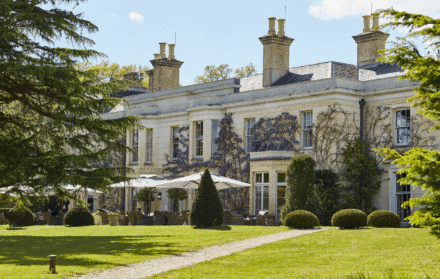
How to own a high-end holiday home abroad
Whether longing for a Tuscan villa, a château in the French countryside or a penthouse in Verbier, these are the trusted estate agents, home-sharing platforms and companies that specialise in luxury holiday homes and co-owning experiences across
Buying a holiday home abroad is no small feat. First, you will need to whittle down your wish list of destinations, before negotiating an alien buying system. Getting on-the-ground guidance will be vital. You can seek expert advice from blue chip companies like Christie’s International Real Estate and Sotheby’s International Realty, all of which have affiliates covering most of the globe – or you can look to a local market leader.
Aside from the tried-and-tested route of simply buying a property in a place you love, you could also opt instead to invest in a portfolio of design-led properties or join the luxury travel club dubbed as ‘Airbnb for millionaires’. Here’s our guide to the developments, agents and property platforms to turn to now to secure your dream home abroad.
International: August

Why own one holiday home when you can have five? This is the premise of August, which offers the benefits of home ownership without the upkeep. Founders Mélie Dunod and Nico Watzenig buy properties in sought-after locations across Europe, which are then renovated to the highest standard. Spacious, light-filled homes promise stylish, contemporary interiors, set against enveloping scenery.
Each investor co-owns the portfolio and can book slots to stay in each abode for an average of 12 weeks each per year. August manages each home, so all you have to do is pack your bags. If you want extras, from cooking to childcare, the August Concierge service will arrange that too.

Collections feature luxury homes in Majorca, Tuscany, Barcelona, Cannes, Provence, Chamonix and the Cotswolds. Unlike property clubs, buyers can opt for real ownership in larger homes, from the Family Collection (€215,000, plus monthly fees of €450), which features houses and apartments with two to three bedrooms, or the Signature Collection (€325,000, plus a monthly management fee of €590), with upwards of four bedrooms.
Dunod advises that care is taken to ensure owners of the curated portfolio are well suited: “We purposely mix our demographic to make sure that clients can easily access the weeks that they want. Retirees are more likely to travel off-season, whereas young families are tied to the school holidays. We also have a lot of older families with children at university, who are more flexible.”
If an investor wants out, or their circumstances change, then August will help sell their share of a portfolio.
Portugal: Lumino

If you’re looking to simplify the buying process then opting for a new build could be the perfect option. Largely eradicating the need for costly and complicated surveys, being the first owner of a new home created by a trusted developer often offers both peace of mind and a fabulous modern property.
Such is the case with Lumino, a vibrant new neighbourhood in Lisbon’s arty Campo Pequeno district, which offers access to the city’s main business and entertainment districts in a matter of minutes. Backed by Round Hill Capital and TPG Real Estate, design comes from local architect Saraiva + Associados in collaboration with British firm TP Bennett, with the first phase of 97 high-spec one- to four-bedroom apartments set to complete in the second half of 2022.

Inside, each apartment has been thoughtfully designed to make the most of its unique location, with floor-to-ceiling windows filling interiors with an abundance of sunlight. Natural materials have also been pressed into service to provide a seamless connection with the outdoors and enhance the space and airiness of each home.
Outside, the 39,000 square metre development will also offer a host of lifestyle amenities for residents. Chief among these is a 15-metre rooftop pool surrounded by a mango wood terrace and shower area, while homeowners will also be able to make use of a pretty south-facing courtyard complete with lush greenery and plenty of space for relaxing and unwinding.
Listed for sale with JLL and Castelhana, apartments at Lumino are available to buy off-plan now.
Switzerland: Sphere Estates

Buying a ski home in Switzerland can be an arduous task, thanks to a series of restrictive laws for overseas buyers, as well as tight planning regulations to prevent the over-development of picturesque Alpine villages.
Despite this, Knight Frank’s 2020 ski report, which assesses the market across the Alps, found that buyers are increasingly enthusiastic about second homes in Switzerland, particularly following its effective handling of the Covid-19 crisis. Three of the most expensive ski resorts in the world are in tiny Switzerland: Gstaad, Verbier, and Zermatt.
“For the last six months, Switzerland has been our most sought-after destination, globally,” says Rob Green, founder of Sphere Estates, which sells luxury holiday homes around the world. “Buyers like the lifestyle, the security, and they think it will be a good investment.”

“Verbier in particular is very popular. We have just sold a property this week to a British family, who already have a property in Switzerland but wanted something a bit more substantial. They bought a four-bedroom penthouse for just over £4m, and they plan to split their time between the UK and Switzerland. They can operate their business remotely so it doesn’t really matter where they are.”
Verbier is a hit because of its varied slopes, vibrant social life and gorgeous scenery. Gstaad is also beautiful, but Green believes it is more of an area to be seen in, than ski in: “The actual skiing is not as good,” he comments.
Green estimates that the average price in Verbier is around £16,000 per square metre. In exclusive Gstaad, you are looking at a starting price of £20,000 per square metre.
France: Leggett

This award-winning family business offers a seamless, multi-lingual service to an international clientele, whether they want to buy a gîte in the Dordogne or a vineyard in Bordeaux. It also trades in equestrian properties, ski chalets, city apartments, and seafront villas.
Romantic types could opt for a glorious 14th-century château in Brittany set in 27,300 square metres of land (€1,885m). The 13-bedroom château is less than three miles from the coast and comes with a separate guest house, lake, spa and treehouse.
If you are after a lock-up-and-leave home, you could plump for a three-bedroom apartment within a newly-converted Belle Epoque building in Nice’s swishy le Carré d’Or neighbourhood (€790,000).

Around half of the company’s clients are French, while the rest are from overseas – notably British 50-somethings looking towards their retirement, and younger families who plan to WFH from a French country property (with excellent broadband). “Houses that sit on the edge of a village with countryside views tend to sell quickly,” said Joanna Leggett, the firm’s head of marketing.
“Since Covid, many British buyers are looking in Brittany, Normandy, the Loire Valley and other areas that are easy to get to by car. They see this as a safe way to travel and rural property in these areas offers exceptional value for money compared to buying a second home in say Sussex, Dorset or Cornwall.”
Italy: Lionard

Since 2008, Lionard has been selling the Italian dream to international buyers, whether they are looking for a front-row mansion overlooking Lake Como, a bellissima Tuscan castle, a palazzo in Venice or a villa on the Amalfi Coast.
Italy, like the rest of Europe, has had a tough year but its prime property market appears to be remarkably resilient, despite the pandemic. According to Knight Frank, enquiries from Dutch, British and German buyers have “accelerated” since its market reopened in May, particularly regarding properties priced between €1.5 and €2.5m. At the very top end, prices on Lake Como increased by five per cent between May and August.

Country homes are also in favour as buyers seek to distance themselves from their neighbours. Amongst the forests and olive groves of Arezzo, eastern Tuscany, you could opt for a nine-bedroom mini castle, complete with turrets and an extravagant tower.
“UK clients are particularly keen on country estates and sea villas,” said Jennifer Giraldi, Lionard’s sales director. “They like properties with history and character, surrounded by large plots of land. The Brits have also rediscovered the hills of Fiesole, Tuscany, and the average sale has been in around the €6m to €10m budget.”
Global: Thirdhome

Referred to as ‘Airbnb for millionaires’, Thirdhome is an international community of second (and third, fourth, and fifth) homeowners who put their holiday pads up for grabs when not in use. In return, they can stay in rather lavish homes belonging to other members of the luxury travel club.
Thirdhome properties are worth an average of £1.8m, and there are some 10,000 to choose from. Money doesn’t change hands between members, but there is a joining fee of £1,800 plus booking fees of £375 to £1,000 per week, depending on which property you choose.

“Our members are successful entrepreneurs, surgeons, architects, lawyers, bankers, accountants and those that have inherited family wealth,” said Giles Adams, European president of the luxury house-swapping service. “They tend to be very seasoned travellers who are probably more adventurous than most and are open to trying new experiences and new ways of getting them.”









